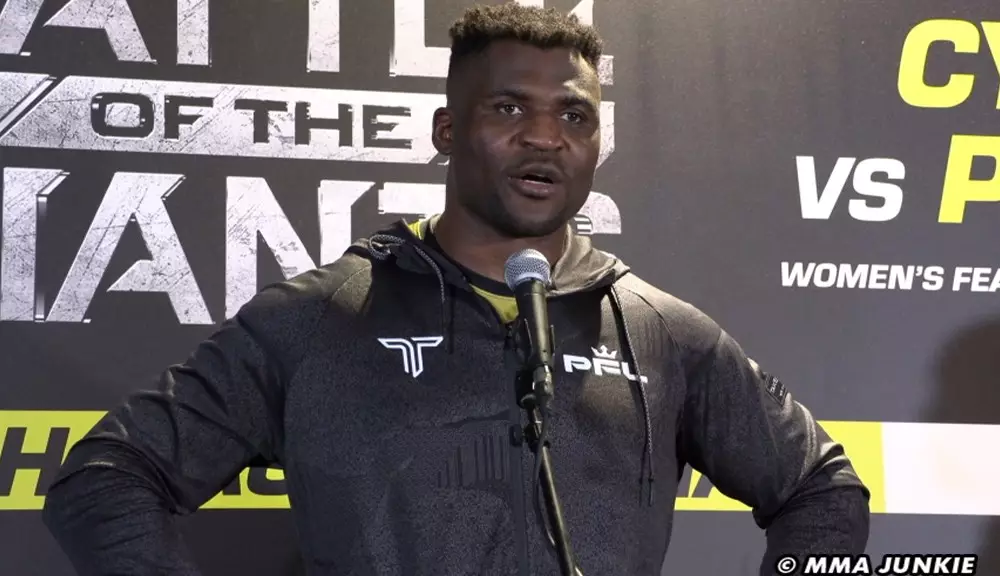The world of mixed martial arts (MMA) is no stranger to stories of resilience and heart. Yet, the narrative surrounding Francis Ngannou’s return to the cage after suffering the tragic loss of his young son, Kobe, holds a uniquely profound emotional weight. Ngannou’s journey, marked by deep sorrow, has been transformed into a powerful demonstration of tenacity and healing through sport. Competing in the inaugural heavyweight superfight title clash at the PFL: Battle of the Giants, Ngannou faced not only the formidable fighter Renan Ferreira but also the unbearable grief stemming from his recent loss. The victory he achieved is more than a mere statistic in his career; it serves as a stepping stone in his ongoing process of healing.
Entering the fight with an 18-3 record, Ngannou was burdened by numerous questions, both internal and external. Having not fought in nearly 1,000 days and facing the background of a crushing defeat against Anthony Joshua in boxing, many wondered if he could still perform at a high level. Ngannou himself had doubts that echoed loudly in his mind. The daunting prospect of returning to the spotlight, underpinned by the melancholic backdrop of his personal life, could have derailed a lesser competitor. Yet, through sheer determination and the will to honor his son’s memory, he stepped into the octagon prepared to reclaim his place among the elite.
This transition from profound personal despair to a triumphant return to athletics is not just remarkable; it is indicative of the complex relationship athletes often have with their physical prowess. Ngannou’s internal battle, juxtaposed with the fight against Ferreira, reveals a multi-layered psyche grappling with loss while seeking to reaffirm his identity as a champion.
The bout itself unfolded as Ngannou displayed his significant grappling skills, opting for ground strikes to secure a first-round TKO victory over Ferreira. This strategic decision highlighted his evolution as a fighter; rather than risking a stand-up striking battle, Ngannou chose a methodical approach that showcased his comprehensive skill set. Post-fight, the raw emotions surfaced, allowing glimpses of the struggle he faced, describing how the events of life can challenge what one perceives as toughness.
Ngannou’s reflections post-fight were nothing short of moving. He indicated that the real toughness extended beyond mere physical endurance, encompassing emotional resilience in the wake of devastating loss. This acknowledgment of vulnerability amidst perceived strength is refreshing, breaking the often ironclad facade that fighters are expected to maintain.
As he processed his emotions following the fight, Ngannou expressed that his victory, while cathartic, wouldn’t erase the monumental challenge of grief he is navigating. His candid remarks about the indefinite nature of mourning are both relatable and poignant. They suggest that while victories in the octagon may offer temporary solace, the underlying pain of loss must be handled delicately over time.
Ngannou’s triumph at the PFL event is not just a personal success; it signifies his ability to adapt and grow through adversity. Like many athletes, he must learn to recalibrate his understanding of success in the wake of personal calamity. The fight demonstrated that he is still a formidable opponent in the cage, but it also hinted at his development as a more nuanced individual beyond sports.
Finding Meaning Beyond the Win
Reflecting on the significance of this particular victory, Ngannou articulated a profound understanding that transcended mere statistics or accolades. He conveyed an insight that the circumstances surrounding his bout made this title win more meaningful than any in his previous endeavors, including his time in the UFC.
Ultimately, Ngannou’s story serves as an inspiring reminder that in the face of profound loss, the spirit of competition can act as a catalyst for healing and growth. The world will continue to watch his journey with bated breath, acknowledging not just his achievements in the cage but the courageous heart that drives him forward. As he continues to process both his pain and his passion, Ngannou embodies a testament to human resilience, navigating the complexities of life and sport with an unwavering commitment to his dual paths of healing and excellence.

